
Search
for
Sort by
Research
150-180 / 1000+ results
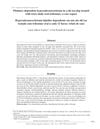
research Pituitary-Dependent Hyperadrenocorticism in a Shi Tzu Dog Treated with Twice-Daily Oral Trilostane: A Case Report
A Shi Tzu dog with high cortisol levels improved after increasing the dose of trilostane.
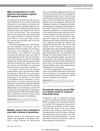
research Finasteride Reduces Serum PSA to a Similar Extent at 1 mg and 5 mg Daily Doses
Finasteride lowers PSA levels about the same whether taken at 1 mg or 5 mg daily.
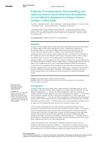
research Follicular Transplantation, Microneedling, and Adjuvant Narrow-Band Ultraviolet-B Irradiation as Cost-Effective Regimens for Palmar-Plantar Vitiligo: A Pilot Study
Combining hair transplantation with microneedling or laser and UV light may help treat tough vitiligo on hands and feet, with microneedling being affordable and easy to learn.
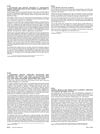
research A Randomized, Blinded, Three-Arm, Multicenter Trial Comparing the Efficacy and Safety of Fluconazole Given Once Daily for 3 or 6 Weeks with Griseofulvin Given Once Daily for 6 Weeks in Pediatric Patients with Tinea Capitis
The two lotions used day and night may be a good alternative to minoxidil for hair loss treatment with better cosmetic effects and tolerance.

research Court of Appeal Can Overrule Itself to Follow the EPO: UK Adopts EPO Stance on Second Medical Use Claims
The UK Court of Appeal ruled that new dosing regimens for drugs can be patented, aligning with the European Patent Office's approach.
research Safety Data of Four Treatment Regimens in Early Rheumatoid Arthritis Patients
All four treatments for early rheumatoid arthritis had similar and mostly mild side effects.
research Effect of a Six-Month Treatment Regimen of Metformin on 17-Hydroxyprogesterone Responses to GnRH Agonist in Polycystic Ovary Syndrome
Metformin can start ovulation and may lower 17P response in PCOS, but six months is too short to improve hair growth or change body fat distribution.
research Comparative Analysis of Safety Data of Four Treatment Regimens in Early Rheumatoid Arthritis Patients
Methotrexate plus prednisolone had the fewest serious side effects.

research Acne Fulminans: Explosive Systemic Form of Acne
Taking finasteride daily can effectively and safely increase hair density and thickness for women with hair loss.
research Feasibility and Tolerability of Eribulin-Based Chemotherapy Versus Other Chemotherapy Regimens for Patients With Metastatic Triple-Negative Breast Cancer: A Single-Center Retrospective Study
Eribulin-based chemotherapy is more effective and has fewer side effects for advanced triple-negative breast cancer.
research Safety, Tolerability, and Pharmacokinetics of Topical Calcitriol Formulation for Treatment of Chemotherapy-Induced Alopecia in Patients Receiving Taxane-Based Regimen: Final Results
Topical calcitriol was safe and well-tolerated for potential hair loss prevention in chemotherapy patients.

research Review of Oral Minoxidil as Treatment of Hair Disorders: In Search of the Perfect Dose
Oral minoxidil effectively treats hair loss, with women needing lower doses (0.25 to 2.5 mg daily) and men needing higher doses (1.25 to 5 mg daily).
research Comparing the Effects of Zinc Sulfate, Calcium Pantothenate, Their Combination, and Minoxidil Solution Regimens on Controlling Hair Loss in Women: A Randomized Controlled Trial
The combination of zinc sulfate and calcium pantothenate effectively controls early-stage hair loss.

research Hair Loss
Hair loss has many causes and treatments, and losing some hair daily is normal; proper diagnosis is key, and minoxidil can help treat it.

research The Impact of Monotherapies for Male Androgenetic Alopecia: A Network Meta-Analysis Study
"Dutasteride 0.5 mg daily is the most effective treatment for male hair loss."

research Colchicine Therapy for Psoriasis
Sudden weight loss can cause significant hair loss, and using colchicine on the skin for psoriasis may be unsafe.

research EEMCO Guidance for the Assessment of Hair Shedding and Alopecia
The document explains hair growth and shedding, factors affecting it, and methods to evaluate hair loss, emphasizing the importance of skin biopsy for diagnosis.

research Assessment of Hair Loss: Clinical Relevance of Hair Growth Evaluation Methods
Effective hair loss assessment requires a mix of precise measurement methods.

research A Critical Assessment of the Evidence for Low-Level Laser Therapy in the Treatment of Hair Loss
The evidence for using Low-Level Laser Therapy for hair loss is limited and more thorough research is needed.

research Breaking the Cycle of Hair Breakage: Pearls for the Management of Acquired Trichorrhexis Nodosa
Proper hair care can prevent and stop hair breakage in people with acquired trichorrhexis nodosa.

research Update on the Dermatologic Use of Systemic Glucocorticosteroids
Systemic glucocorticosteroids are a primary treatment for various skin conditions but require careful management due to potential side effects and relapses.

research Diffuse Alopecia of the Scalp in Borderline-Lepromatous Leprosy in an Indian Patient
A neglected leprosy treatment led to rare scalp hair loss in an Indian woman, which improved with proper medication.

research The Relative Effect of Monotherapy with 5-Alpha Reductase Inhibitors and Minoxidil for Female Pattern Hair Loss: A Network Meta-Analysis Study
Finasteride 5mg daily is the most effective for female pattern hair loss, with higher doses of treatments generally more effective.
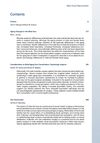
research Contents
Men's facial rejuvenation involves unique challenges and is increasingly popular, with many opting for nonsurgical treatments.

research Cyproterone Is Effective for Androgenetic Alopecia in Women
Cyproterone helps women with hair loss caused by genetics. More research is needed to confirm the best dose.

research Management of Severe Childhood Hypertension with Minoxidil: A Controlled Clinical Study
Minoxidil helps lower blood pressure in kids with severe hypertension, but may cause temporary excessive hair growth.

research Hepatotoxicity with Low- and Ultralow-Dose Flutamide: A Surveillance Study on 203 Hyperandrogenic Young Females
Low and ultralow doses of flutamide can cause liver damage in young women with high androgen levels, regardless of dose or birth control use, with higher risk for those with higher BMI and liver enzyme levels before treatment.

research Selenium as an Element in the Treatment of Ovarian Cancer in Women Receiving Chemotherapy
Taking selenium supplements during chemotherapy may help reduce side effects and improve health markers in ovarian cancer patients.

research Flexural Agminated Eruptive Nevi in Langerhans Cell Histiocytosis
Sunlight exposure improved a patient's skin condition, and there may be a link between a certain disease and skin growths; a leukemia treatment caused changes in hair color and growth.